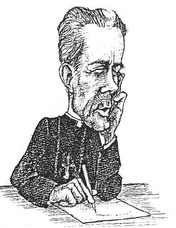
Liberalism is war on God, and it is the dissolution of truth. Within today’s Church crippled by liberalism, sedevacantism is an understandable reaction, but it still credits authority with too much power over truth. The modern world has lost natural truth, let alone supernatural truth, and here is the heart of the problem.
For our purposes we might divide all papal teaching into three parts. Firstly, if the Pope teaches as Pope, on Faith or morals, definitively and so as to bind all Catholics, then we have his Extraordinary Magisterium (EM for short), necessarily infallible. Secondly, if he does not engage all four conditions but teaches in line with what the Church has always and everywhere taught and imposed on Catholics to believe, then he is partaking in what is called the Church’s “Ordinary Universal Magisterium” (OUM for short), also infallible. Thirdly we have the rest of his teaching, which, if it is out of line with Tradition, is not only fallible but also false.
By now it should be clear that the EM is to the OUM as snow-cap is to mountain. The snow-cap does not make the summit of the mountain, it merely makes it more visible. EM is to OUM as servant to master. It exists to serve the OUM by making clear once and for all what does or does not belong to the OUM. But what makes the rest of the mountain visible, so to speak, is its being traceable back to Our Lord and his Apostles, in other words, Tradition. That is why every EM definition is at pains to show that what is being defined was always previously part of Tradition. It was mountain before it was covered in snow.
By now it should also be clear that Tradition tells the Popes what to teach, and not the other way round. This is the basis on which Archbishop Lefebvre founded the Traditional movement, yet it is this same basis which, with all due respect, liberals and sedevacantists fail to grasp. Just see in the Gospel of St John how often Our Lord himself, as man, declares that what he is teaching comes not from himself but from his Father, for instance: “My doctrine is not mine but his that sent me” (VII, 16), or, “I have not spoken from out of myself; but the Father who sent me, he gave me commandment, what I should say, and what I should speak” (XII, 49). Of course nobody on earth is more authorized than the Pope to tell Church and world what is in Tradition, but he cannot tell Church or world that there is in Tradition what is not in it. What is in it is objective, now 2,000 years old, it is above the Pope and it sets limits to what a Pope can teach, just as the Father’s commandment set limits to what Christ as man would teach.
Then how can liberals and sedevacantists alike claim, in effect, that the Pope is infallible even outside of both EM and OUM ? Because both overrate authority in relation to truth, and so they see Church authority no longer as the servant but as the master of truth. And why is that ? Because they are both children of the modern world where Protestantism defied the Truth and liberalism ever since the French Revolution has been dissolving objective truth. And if there is no longer any objective truth, then of course authority can say whatever it can get away with, which is what we observe all around us, and there is nothing left to stop a Paul VI or a Bishop Fellay from becoming more and more arbitrary and tyrannical in the process.
Mother of God, obtain for me to love, discern and defend that Truth and order coming from the Father, both supernatural and natural, to which your own Son was as man subject, “unto death, even to the death of the Cross”.
Kyrie eleison
The loss of objective truth in depth explains
The Church’s sedevac and liberal pains.
A non-exclusive license to print out, forward by email, and/or post this article to the Internet is granted to users who wish to do so provided that no changes are made to the content so reproduced or distributed, to include the retention of this notice with any and all reproductions of content as authorized hereby. Aside from this limited, non-exclusive license, no portion of this article may be reproduced in any other form or by any other electronic or mechanical means without permission in writing from the publisher, except by a reviewer who may quote brief passages in a review, or except in cases where rights to content reproduced herein are retained by its original author(s) or other rights holder(s), and further reproduction is subject to permission otherwise granted thereby.




